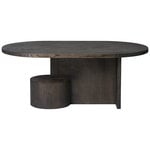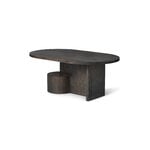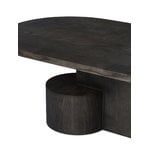ferm LIVING's Insert coffee table boasts a strong and distinctive sculptural form with fascinatingly asymmetrical shapes making up the structure: carrying a sleek oval top, the table’s T-shaped base is balanced by a cylindrical support, which also acts as a handy surface for remote controls. Skilfully made of ash wood, the Insert coffee table is adorned with natural wood grain patterns that soften the table’s geometric look – Insert is like a functional work of art that imbues your living space with sculptural edge and, at the same time, the natural beauty of wood.





Insert coffee table, black stained ash
ferm LIVING
Description
ferm LIVING's Insert coffee table boasts a strong and distinctive sculptural form with fascinatingly asymmetrical shapes making up the structure: carrying a sleek oval top, the table’s T-shaped base is balanced by a cylindrical support, which also acts as a handy surface for remote controls. Skilfully made of ash wood, the Insert coffee table is adorned with natural wood grain patterns that soften the table’s geometric look – Insert is like a functional work of art that imbues your living space with sculptural edge and, at the same time, the natural beauty of wood.
Product details (7)
- Colour
- Black
- Length
- 60 cm
- Width
- 100 cm
- Height
- 40 cm
- Material
- Black stained solid ash
- Weight
- 22.5 kg
- Care instructions
- Wipe with a damp cloth
- Product ID
Designer
Mario Tsai is a Chinese designer who founded his own studio in Hangzhou in 2014. Tsai specializes in product, furniture and industrial design and he also works with art installations and interiors in China and abroad. Sustainable methods and exploring the potential attributes of materials form the core of his designs, and he aims at improving both society and the environment with his work.
View all productsReviews (0)
Sustainability
The Product Sustainability Framework, our criteria of sustainable design, helps you find the most sustainable products in our selection. Read below which sustainability criteria this product has met.
Working conditions & labour 8/9
-
Equal opportunities for all employees
-
Commitment to UN Global Compact, fair compensation for all employees
-
Corporate responsibility requirements defined and communicated for suppliers
-
Systematic work for improved inclusion and well-being in the workplace
-
Transparent supply chain
-
Suppliers' compliance to a code of conduct ensured
-
Direct suppliers audited and certified
-
Compliance to the UN Guiding Principles on Business and Human Rights ensured in the supply chain
-
Support for community involvement in the supply chain
Eco-friendly production 8/9
-
Fair and resource-wise water-use in production
-
No incineration or landfilling of returned items
-
No use of endangered species as materials
-
No direct environmental emissions or waste (excl. GHGs) from production
-
The sustainability of direct suppliers' production is addressed and monitored
-
Production and material sourcing that respect biodiversity, animal rights, and natural ecosystems
-
Material-efficient and ecological packaging
-
No potentially harmful chemicals used in own production
-
Positive impact on nature’s well-being through operations that regenerate natural ecosystems
Climate impact 5/8
-
Company's direct greenhouse gas emissions identified and commitment to reduction
-
Product's carbon impact identified and commitment to reduction
-
Guidance on energy- and eco-efficient use of the product
-
Contribution to climate initiatives beyond the brand’s direct operations
-
Carbon footprint of the product calculated and goals set to reduce it
-
Low-carbon or compensated transportation
-
100 % renewable energy in own production and operations
-
Carbon neutral or carbon negative product
Sustainable materials 6/6
-
Sustainable and long-lasting material choices
-
No harmful or hazardous substances
-
Responsible raw material sourcing and production
-
Materials suited for circularity: monomaterials, recyclable finishings, renewable or recycled contents etc.
-
Ecological materials: natural, biodegradable, recyclable or recycled contents
-
Outstanding materials in terms of innovativeness, responsibility, sustainability and circularity: local production or sourcing, 100 % recycled content, C2C-certification etc.
Circular design 4/5
-
High aesthetic quality promoting long-term use of the product
-
Technically durable product design and material choices
-
Design for enduring life-long quality
-
Design and support for product maintenance, repair and upgradability
-
Innovative circular design solutions: circular service system, resale platform, remanufacturing, collection of used products, etc.







